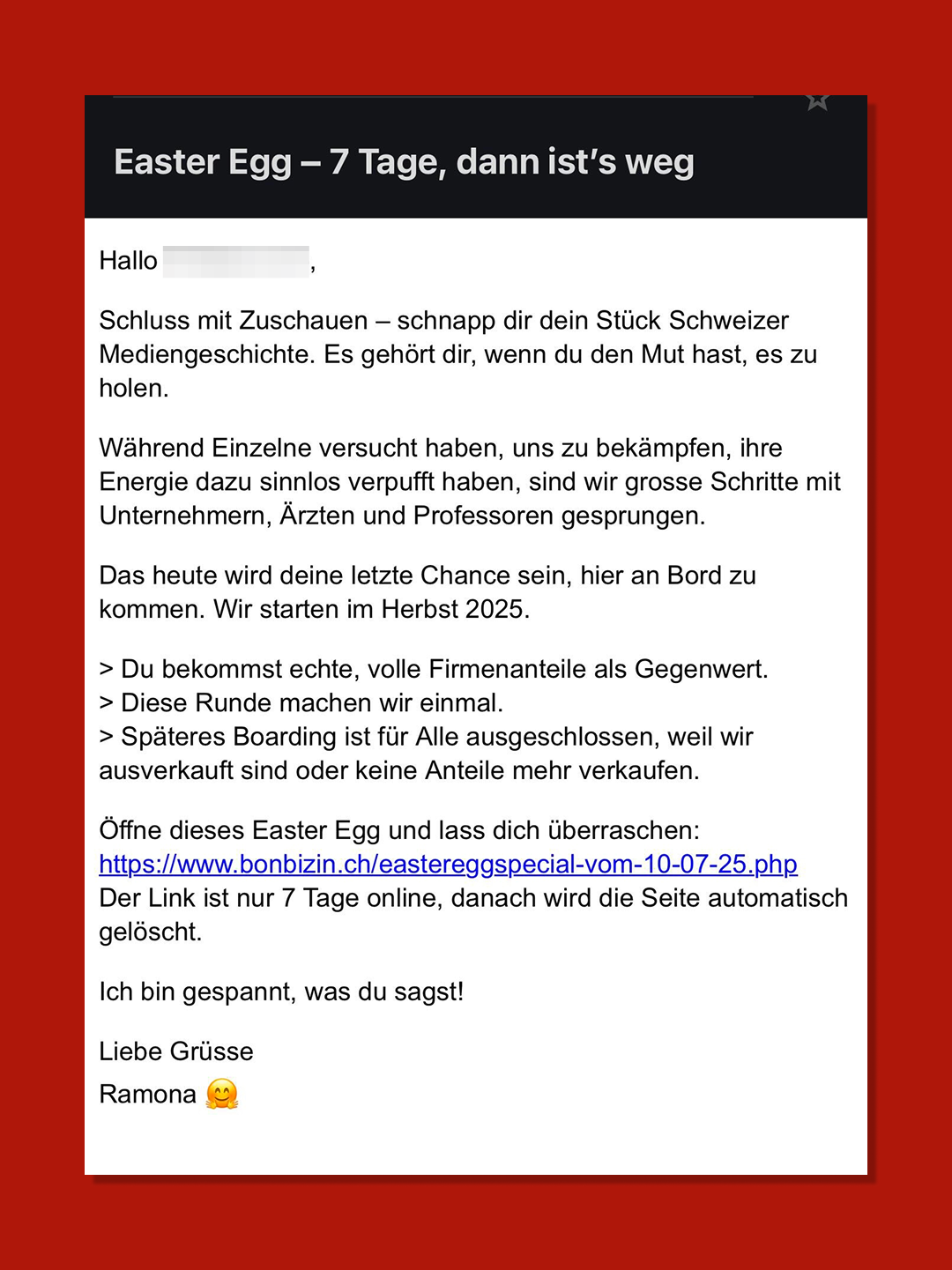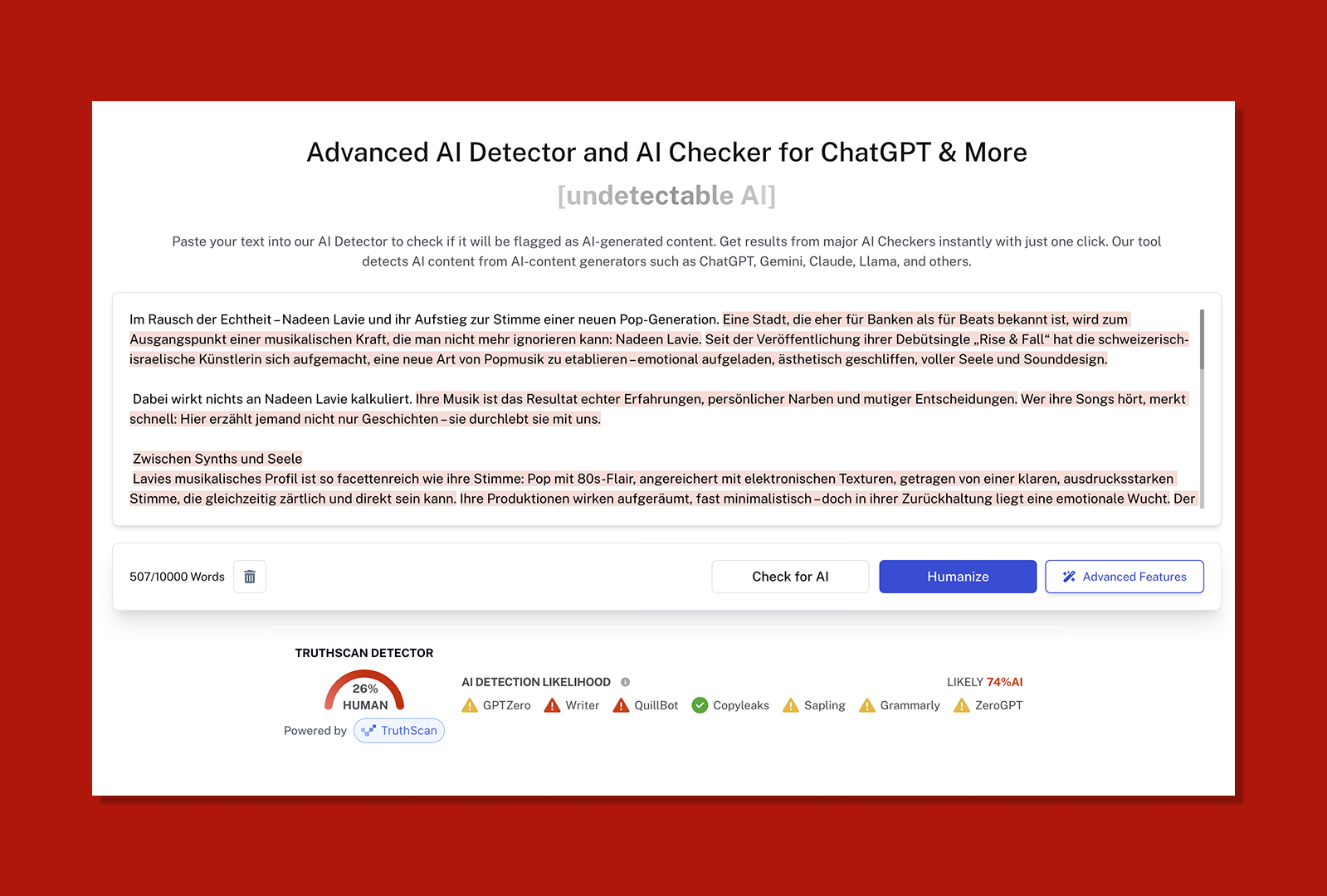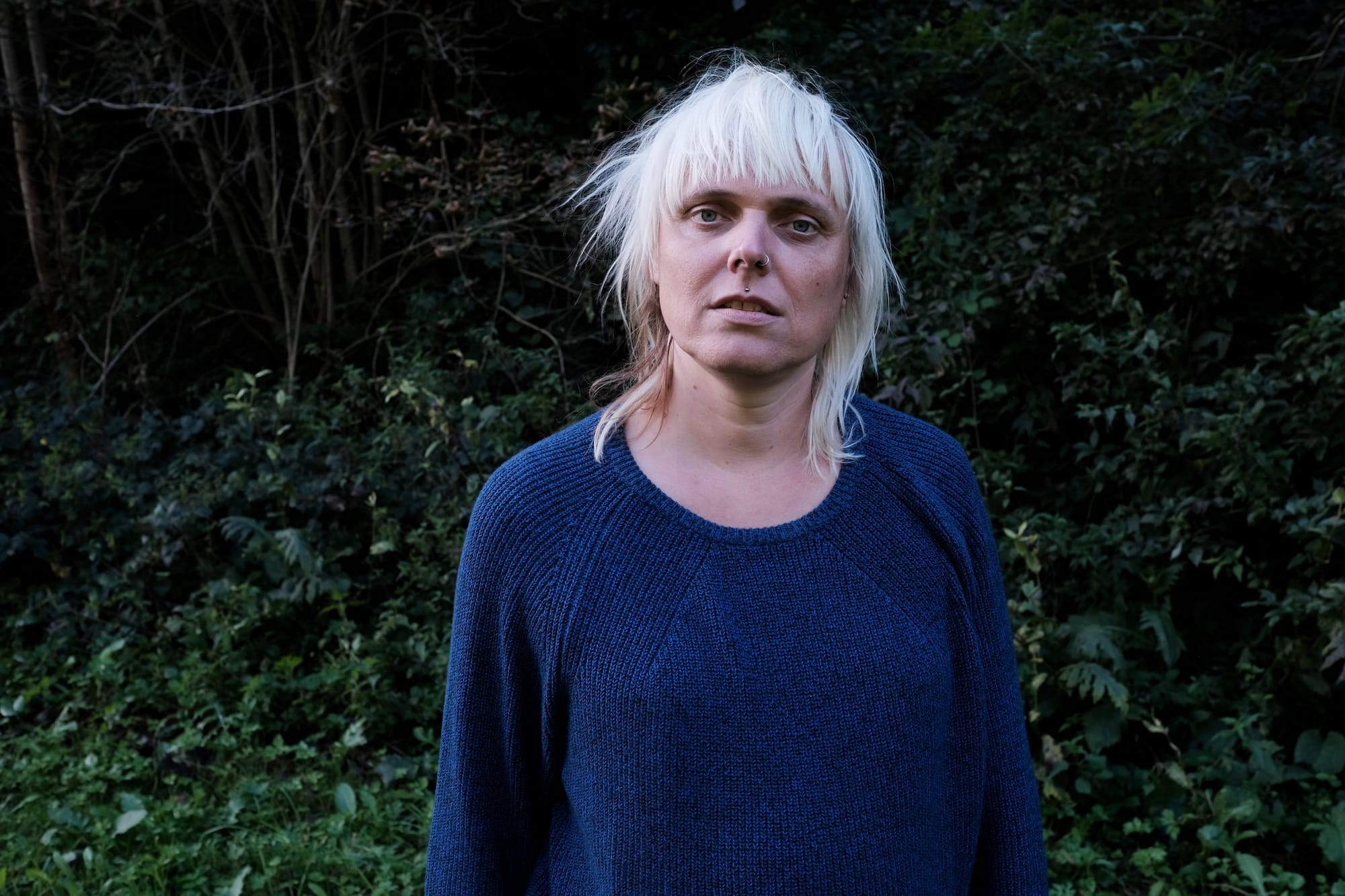The baiting continues. After Negative White reported on the investment scheme by Fashionpaper targeting Swiss musicians in March, I’ve regularly checked on the situation. It was relatively quiet until mid-July, when another email was sent to many artists, offering shares at a reduced price of CHF 14 instead of CHF 140.

My personal advice is still: Don’t touch this with a ten-foot pole. As an artist, you’re likely better off investing any money into anything else, like a personal newsletter, than here. Especially, if you read through the few „artist features“ published by Fashionpaper. Although not entirely reliable, AI detectors were triggered quite frequently by those stories.

Two major stories have kept the global music business busy in recent weeks. On the one hand, there was the news of Spotify CEO Daniel Ek’s investment in the German AI armourer Helsing, on whose board of directors Ek now also sits. Negative White has already reported on this in detail.
Curiously, artist backlash only now, with Ek’s second round of investment, started to swell. As a first and prominent mover, Deerhoof pulled their music from Spotify, and the band Xiu Xiu also announced their imminent departure from the streaming service. The Needle Drop interviewed Xiu Xiu’s Jamie Stewart on their reasoning, financial impact, and challenges. King Gizzard & the Lizard Wizard followed suit by the end of last week. It feels like there is a momentum here—especially if more significant indie bands throw their weight behind it.
The second narrative revolved around the AI-generated band The Velvet Sundown, prompting me to publish a rather anger-fuelled piece about the organised crime that is generative AI.
What both stories have in common, however, is the underlying technological forces disrupting the music business at rapid speed—further underlining the search for a sustainable business model around music and pushing ethical questions alike. The dependency and influence of the so-called „broligarchs“, whether European like Daniel Ek or envisioning their technofeudalism from Silicon Valley, is a global phenomenon that impacts the Swiss music business as well.
There’s a need for alternatives, but the local scene appears to be somewhat sluggish in embracing new platforms, services, and ideas. That’s why I sat down with Hilke Ros, an artist and part of the Red Brick Records collective, as well as a vocal advocate for social network alternatives like Bluesky.
Even though Hilke‘s activism in this space is rather new, it stems from a personal place: „As a transgender person, people like me have been directly targeted for some time now in the US. I can‘t just look away.“
The full conversation about alternative platforms, community building, and Swiss tax money going to Meta is today‘s focus topic.
Best,

🗞️ Headlines
- Good News Productions cooperates with „KulturLegi“
Good News Productions AG, one of Switzerland’s larger concert and show organisers, will become an official partner of „KulturLegi“ on 1 July 2025. Holders of a KulturLegi will receive a 30% discount on selected concerts from Good News’ programme, Good News and Caritas wrote in a joint press release. - Helvetiarockt Music Directory celebrates its five-year anniversary
With its Music Directory, Helvetiarockt provides a platform that highlights FINTA* individuals working in the Swiss music industry. To celebrate the platform’s anniversary, Helvetiarockt announced a birthday party on October 4 at Fri-Son. - Study on cultural offerings in the canton of Fribourg
The canton of Fribourg has published a study analysing the current state of cultural institutions and organisations in its area. The study, published in French but also summarised in German here, features a couple of interesting insights. For example, every franc invested in subsidies generates around CHF 2.30 in expenditure and CHF 2.70 in added value in the cantonal economy. Or that 20% of institutions draw 80% of the audience as well as 80% of the registered jobs. - Small festivals struggle to remain free
A report by Swiss Romand television RTS reveals how small festivals are facing financial challenges. Some have to start charging entrance fees due to rising production costs and artist fees, while the revenue from drinks continues to decrease. Petzi’s Anya Della Croce states that while a decrease in alcohol consumption is good news for public health, it has dramatic consequences for free music festivals.
Related to this topic, Tages-Anzeiger published a story (Paywall possible) exploring the death of grassroots festivals while larger events continue to thrive. - Diversity on Swiss festival stages stagnates
Tages-Anzeiger also analysed the line-up of Switzerland’s biggest festivals, revealing a dire stagnation in the quota of female acts on stage. In the accompanying interview, Rilke van Kleef, German booker and author, does not mince words, especially regarding market consolidation: „I don't get the impression that CTS Eventim and Live Nation protect and want to protect marginalised, queer people. At the end of the day, they are commercialised corporations.“
At Negative White, we rely on Ghost, an independent and open-source publishing technology, to manage our website, newsletters, and memberships in one place. Try it today and leave the tech broligarchs behind.
📱 „It’s completely insane that a lot of public funding is going to Meta because artists invest it in advertising“
Hilke, you‘re quite the activist for alternative social media platforms, promoting them among Swiss musicians. What‘s driving you?
It started just after Trump was elected, especially the statements by Mark Zuckerberg and how the tech CEOs actually chose his side. The fascism that‘s growing and growing. I felt that I really needed to do something now.
As a transgender person, people like me have been directly targeted for some time now in the US. I can‘t just look away. So, I had been searching for some time to find out how I could make an impact. Because I‘m a software developer, I wondered if I should become a hacktivist…

So, it‘s a very personal motivation.
It is. But I see myself mainly as an artist and a musician, asking myself what I could do. There were a couple of people around me with the same question, and we organised a small gathering at the One Of A Million festival in Baden. It prompted me to research the alternative more because I knew nothing about the Fediverse or what‘s happening with Bluesky and their AT Protocol. I saw a way to use my technical knowledge to do something about these fascist tendencies.
If you envision a utopia for a sustainable digital ecosystem for musicians, what would it look like?


